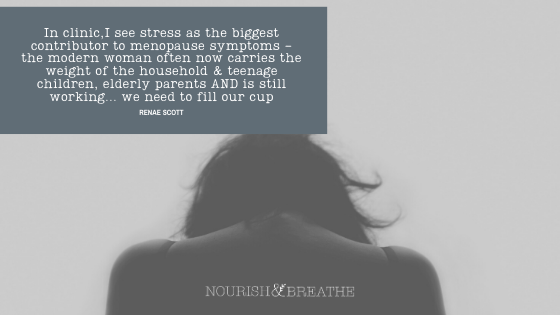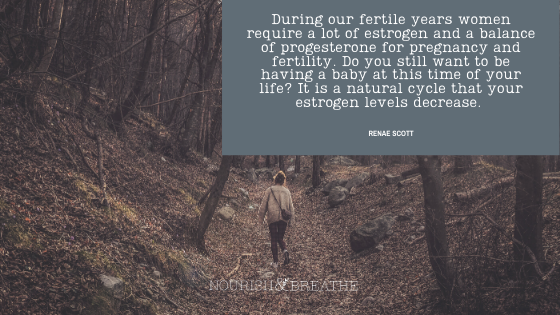Menopause Wellness
Menopause - Greek - the monthly pause!!
Menopause is a life phase transition, just as puberty is, or the time of motherhood.
Remember how confronting, challenging and life changing these times were....menopause is the next transition. I am a strong advocate for living the experience, really sitting with what is happening and acknowledging all that is going on. And from that point of understanding and gratitude for our physical body, our temple - and our temple is truly amazing - we can move forward with grace and acceptance. We can learn to listen and nurture, and respond with what we feel we need. Our body provides big clues, and works really hard to function well, to balance our energy, hormones and emotional well being. At times it is very easy to feel let down or disconnected with what is going on during this transition time, however it is important to connect to this body of ours. Practices such as walking in nature, yoga and mindful breathing are useful and essential, it allows the space to connect within.
THE FACTS
Menopause is a definition in retrospect - it is when we have not had a period for 12 months, now you have reached menopause! The ovaries stop ovulating and releasing an egg, and the cycle of hormones eventually balances out, without all the rises and falls of hormones, so that our monthly bleed, after decades, finally stops. Average age of menopause is 51 yrs, range 40-55 yrs. The ovary is not completely depleted of eggs, but the remaining follicles/eggs are of poor quality and less responsive to hormone stimulation and are eventually reabsorbed. The age of your menopause is known to be primarily influenced by your genetics. It is useful to have the conversation with sisters, aunts and mum as to their experience with their menopause.
Peri-menopause - the time leading up to menopause, is the transition time that we are most interested in. This time will be very different for each and every woman, and may even vary for you over the course of that time. The length of peri-menopause, the severity of symptoms and which symptoms you experience in peri-menopause, and even the years after are dependent on your genetics and health - stress, the life you are leading, lifestyle and diet.
WHAT TO EXPECT
80% of women experience symptoms with menopause, 10% experience symptoms indefinitely. Factors that are known to influence the constellation of your symptoms include:
The amount and rate of oestrogen depletion, and
The ability to facilitate the adjustment associated with aging ie the psychological impact of aging
Your Menstrual Cycle
At the beginning you may experience shorter menstrual cycles, every couple of weeks, you may ovulate, you may not. You are likely to experience irregular periods. You may suddenly stop having a period and there is no more. You may have spotting, longer periods, shorter periods, heavier periods….a strong heavier bleed that continues for weeks/months should always be investigated. Unfortunately there are uterine conditions that can arise during this time and consistent heavy bleeding should be investigated.
The menstrual cycle quickens or becomes irregular due to the rise and fall of estrogen and progesterone as our egg numbers diminish and the hormone stimulation from the endocrine glands does not create an appropriate, or the typical, response from the ovarian hormones. As the cycle becomes more irregular, your moods may become more erratic leaving you feeling unbalanced - you are becoming an emotional teen again!
Hot Flushes
Hot flushes are part of a series of symptoms experienced with a change in blood vessel function - flushes/night sweats, headaches, palpitations, sleeplessness, excessive tiredness, even formication - restless legs, ants crawling under the skin. The exact medical causation of these symptoms are not known.
These symptoms are indirectly linked to reduced oestrogen but oestrogen is not the entire answer as not all women with reduced oestrogen experience hot flushes, there are other factors at play. It is known that your internal thermostat control has narrowed. If your temperature goes above this range your body reacts to cool you down resulting in a flush - a transient flushed feeling around the face and neck, and can be more severe with sweating, increased heart rate with post chills. This can cause sleep disturbances, resulting in fatigue and psychological symptoms of depression and anxiety due to the lack of sleep. The alpha-adrenergic system, these are the receptors for adrenaline - adrenal hormone, is implicated in hot flushes.
It seems a combination of these factors affects the thermoregulatory function and the flush.
Psychological Symptoms
Can be non-specific and generalised - emotional, anxiety, depression, irritability, mood changes, fatigue, and forgetfulness.
These symptoms are often associated with “oh it’s my menopause” as for some it is considered more acceptable than a diagnosis of depression. Mental health can be associated indirectly to menopause due to the impact on sleep deprivation or directly to changes of hormone and neurotransmitter levels.
But... it is time to consider what is happening in your life at the moment - aging, mortality, stress, life fulfilment, empty nesting, stress, illness, death of parents or partner. The modern day woman has a lot of demands and stresses, and she is quite likely still out ion the workforce. This has a lasting and significant impact on your emotional health. These demands are likely to be unavoidable, but it is time to acknowledge the effect these demands are having on your health, and it is important to establish a way forward to support your health. To fill up your cup. Small steps and changes can have a big impact on your emotional well-being.
Vaginal and Urinary Symptoms
Associated with reduced oestrogen at menopause is a change to skin, a dryness of tissues especially the vagina with irritation and painful sex often experienced. The bladder may also be affected with increased urinary frequency, and an increased risk of urinary tract infections. Oestrogen deficiency results in epithelial and connective tissue atrophy, 60% of women may experience these symptoms. The base of urinary bladder and urethra stem from the same tissue and similar changes occur with declining estrogen and hence the tendency to urinary sensitivities, UTI seen with or without infections.
Osteoporosis
In Aust 50% women and 33% men over 60 have an osteoporotic fracture, and is a major cause of death and disability in Australia. Avoidable factors known to influence bone health are the incidence of smoking, physical inactivity/mobility, nutritional factors. And there are many other causes of osteoporosis - renal failure, diabetes, malabsorption syndromes, medications such as corticosteroids, antacids, methotrexate, excessive thyroid replacement therapy. Therefore although estrogen plays an important part of bone health there are many other conditions that influence bone health.
WHAT YOU CAN DO
STEP 1 Establish a self-care routine. Nurture. Rituals. Movement. Fill up your cup.
STEP 2 Balance the stress in your life. A walk a day can be enough to help..
STEP 3 Check in with your diet & nutrition needs. Energy & dietary needs change.
Blood Tests. You might head off to the GP and request/demand a diagnosis for all of that is going on. A baseline check of your blood chemistry is a great idea so that your health can be monitored over the coming years. But...We are very used to in today's society to head to the GP for diagnosis. Menopause is very much a personal experience, blood hormone tests will reveal different results depending on the time of day, day of the month, and other factors going on in your life - very early you will have very high follicle stimulating hormone, and at the very end you will have low estrogen, and everything in-between as well.
A Final Note From Me on Estrogen.
A lot of the talk around menopause is the loss of estrogen. During our fertile years women require a lot of estrogen and a balance of progesterone for pregnancy and fertility. Do you still want to be having a baby at this time of your life? It is a natural cycle that your estrogen levels decrease.
I would just like you to consider this for a moment. I feel we have a mindset to maintain the same level of estrogen as we had in our 20’s and 30’s.
I would love you to consider, acknowledge and celebrate your life. When we are young girls, so eager, so full of promise and enthusiasm and headstrong, going out into the world, making our mark, finding our way, following your dreams, and even being influenced. Now at this life stage you are truly free and carry the wisdom of experience and now have so much to give, live and enjoy. Celebrate and connect with this new phase of your life. Rejoice, be proud of all that you have done and achieved.
Own it, set intention, and look after yourself!
Embrace The Forest Dweller - The Crone
As a naturopath I am here to support with herbal medicines and nutrients to alleviate symptoms, and guide with diet and lifestyle recommendations that align with your needs.
I completed a degree in Reproductive Medicine at UNSW which covered Menopause. As a practitioner that works with women. I found it illuminating as I realised that conventional medicine does not have the answers as to the why of menopause symptoms and disappointed as no answers for treatment beyond Hormone Replacement Therapy (HRT). I was frustrated because in the teaching an emphasis is not placed on non-invasive ways to support women going through this phase of their life. Menopause appears to be considered and treated like a disease and a nuisance. When treated like a disease HRT is the magic pill fix. But at some point balance must be found and that I believe is the beauty of natural, alternative and complementary medicine.





